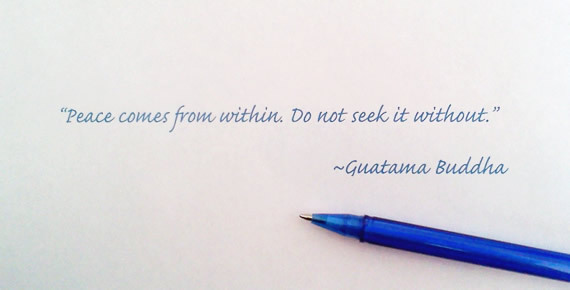
Meditation is a wonderful tool for decreasing feelings of stress and anxiety, and increasing feelings of peacefulness, contentedness and connectedness. It helps you stay present in the moment so that you can experience your life as it happens, rather than always being caught up in the past or the future, and it can help you gain a deeper understanding of your true self. And yet, for so many people, starting a regular meditation practice is a frustrating and difficult task.
Here are 10 simple meditation tips for beginners to help you get through that initial frustration and get started with your own meditation practice:
Tip #1: Make it a habit.
The best way to make progress with meditation and really get it to start working for you is to turn it into a habit. Make it a formal practice with time that you dedicate specifically to meditation in your schedule. Do it at least once a day -- twice if you are able to manage it.
Tip #2: Start small.
Don't listen to people who tell you meditation doesn't count unless you do it for half an hour at a time. Maybe you'll get to the stage where you want to do it for that length of time, but don't start out trying to force yourself to be still for that long. Try five minutes at first, and then when you're comfortable with that, work your way up in five-minute increments until you get to a practice length that feels right for you.
Tip #3: Guard your time.
Make sure that you dedicate a time for meditation when you know you won't be disturbed. You're not going to be able to still your mind if you're thinking that the kids will be home soon, or that the baby will wake from her nap soon, or that you have a board meeting in an hour and you're expecting your secretary to bring you the agenda for approval any minute now. Pick a time in your day when you know you will have the undisturbed time that you need.
Tip #4: Try stretching.
If you're new to meditation, doing some light stretches before beginning your meditation practice can help you loosen up any muscle tension that might make sitting still for a while uncomfortable for you. Stretching also helps you bring your focus inward and helps center you.
Tip #5: Pick a comfortable position.
Many of the experts out there are going to tell you to sit in a straight-backed chair with your feet flat on the floor, or to kneel with a cushion tucked under you for support. And I'm sure you've seen all the pictures of yogis and swamis in full lotus position while they meditate. But if you're not comfortable in such positions then try something else: lie flat on your back on something comfortable, or sit on a comfy couch with your legs crossed and your back supported. The key is to find something that feels comfortable for you and your body, or you're just not going to keep at it. It's not the position you're in that's important here; it's the stillness and quieting of the mind that is important.
Tip #6: Set your intention.
Before you begin your meditation practice, set your intention for the practice; what is it that you want to get out of this meditation session? Is it clarity? Is it relaxation? Peace? Connection? Set your intention before you start so that your subconscious mind knows what to work on.
Tip #7: Focus on your breath.
If you're just starting out with meditation, focus on your breathing. Count your breaths as they flow in and out, and slow your breathing down. Breathe deeply. It slows your heart rate and helps you to relax. It also helps to focus your mind so that your random thoughts are less likely to intrude.
Tip #8: Don't stress over it.
If you start to get frustrated because your mind keeps wandering and you can't seem to focus yourself very well, don't stress over it. This is normal when you begin meditating -- it really is very common, and nothing to be concerned about. When you feel the frustration creeping in, just bring your awareness back to your breaths and start counting them again. You can try using breath patterns, if it helps. For example, instead of every breath in as one and every breath out as another one, count cycles; one breath in and one breath out is "one", another breath in and out is "two", etc...
Tip #9: Practice gratitude.
At the end of your session, take a minute or two to appreciate the fact that you have begun your new meditation practice. Appreciate that, even though you may have had trouble focusing, there were moments when you achieved the intention you set. Gratitude is the cornerstone to building everything you want in life, including a beneficial meditation practice!
Tip #10: Be present throughout the day.
Even if it's not your set "meditation time", finding moments throughout your day to practice mindfulness and being fully present in the moment is a great way to strengthen and build your meditation habit and abilities.
When you start meditating and deliberately trying to quiet your mind, you will quickly become aware of just how many thoughts are racing around your head, all the time. Don't beat yourself up over all of this. With practice, you will learn to deflect these thoughts and "quiet the chattering monkeys" so that you can find the inner calmness that you're looking for. It does get easier the more you do it!
Nathalie Thompson is the author of Seven-Minute Stress Busters and the founder of VibeShifting.com, your guide to mastering the methods and mindsets of success and transforming your dreams into reality. For more inspiration, sign up now for free access to her "Build Your Best Life" video course!
photo credit: (c) Nathalie Thompson
